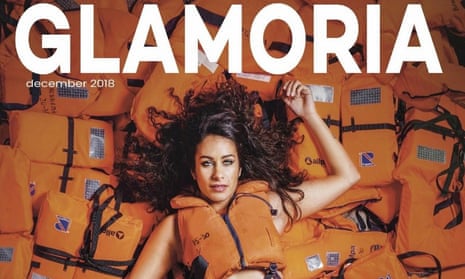Two leading international charities have been criticised for using inappropriate images – one of a semi-clad model lying on a bed of lifejackets – in campaigns intended to raise awareness of Ebola and of the refugee crisis on Greek islands.
On Wednesday, the Dutch branch of Médecins Sans Frontières, Artsen Zonder Grenzen, halted their Face It campaign, in which actors and Instagram influencers wore makeup to mimic Ebola symptoms. The charity said the images were designed to raise awareness.
This article includes content provided by Instagram. We ask for your permission before anything is loaded, as they may be using cookies and other technologies. To view this content, click 'Allow and continue'.
Separately, Amnesty International Netherlands faced criticism after it produced a magazine designed to highlight the refugee crisis, placing an image of a half-naked woman on the front cover, in which she is pictured lying on a bed of life jackets.
Amnesty International has since dropped the cover and apologised, admitting it “trivialised the suffering and trauma refugees have experienced fleeing their homes, particularly women”.
The human rights group’s Netherlands branch said it was intended as a parody of a glossy magazine, contrasting luxury lifestyles with the appalling conditions facing people trapped in camps on Greek islands. The front cover featured the actress Jouman Fattal, who was forced to leave Syria when she was four years old.
The magazine promised “must haves” to survive a winter in a refugee camp, and mentioned an anti-rape lock for women who want to go to the toilet at night.
The UN has previously warned of heightened levels of sexual violence facing female refugees on Greek islands. Charities report that women are afraid to use showers or toilets in the overcrowded camps.

Campaigners Alexia Pepper de Caires and Shaista Aziz, who founded the group NGO Safe Space in response to cases of sexual harassment and sexual abuse in the aid sector, described Amnesty International Netherlands’ campaign as grotesque.
“The Mediterranean has become a graveyard … it’s incomprehensible that one of the world’s richest and most powerful human rights NGOs has turned it into a backdrop for a fashion shoot,” they wrote in an open letter published on the website Media Diversified. “Women have given birth in life jackets, miscarried in life jackets and died in life jackets.
“The simple and inconvenient fact that has been erased by Amnesty Netherlands is that many of the black women and women and girls of colour who constitute the majority of the world’s refugees exist in contexts where their bodies do not belong to them.”
The magazine was designed to draw attention to a petition calling on the Dutch government to take in 1,000 people who are stranded on the Greek islands.
Amnesty International Netherlands said the magazine was produced in collaboration with former refugees and activists. “We never intended to offend anyone and regret that the choice for the cover has been a distraction from our ongoing work to end the dire situation for many trapped on the Greek islands.”
Amnesty International added: “We realise the images also compounded sexualised gender stereotypes that harm and objectify women, specifically women of colour. We are conscious that the use of life jackets as a prop was particularly hurtful to people who have depended on these for their survival. We are profoundly sorry for this.”
Last month, the UNHCR, UN refugee agency, warned of abhorrent conditions facing refugees on Greek islands, where reception centres are severely overcrowded and new arrivals forced to buy flimsy tents. “[Tents] offer little protection from the cold weather, without electricity, running water or toilets. There are snakes in the area, and rats are thriving in the uncollected waste,” the agency said.
MSF Holland said its campaign was designed to raise awareness of diseases. Its teams are responding to the ongoing Ebola outbreak in North Kivu province, in the north-east of the Democratic Republic of the Congo, which has been hit by violence and instability. As of 19 December, 494 Ebola cases and 271 deaths from Ebola have been recorded.
“The idea was to bring diseases that don’t usually appear in Holland closer to home,” said Katherine Knowles, coordinator for press and communications MSF Holland. “We don’t use real patients, we would never do that, so the idea was to use influencers and people who are recognised and who people related to.”
Knowles added that the aim of the images, to raise awareness of diseases, had been overshadowed by criticism and that they had halted the campaign.
